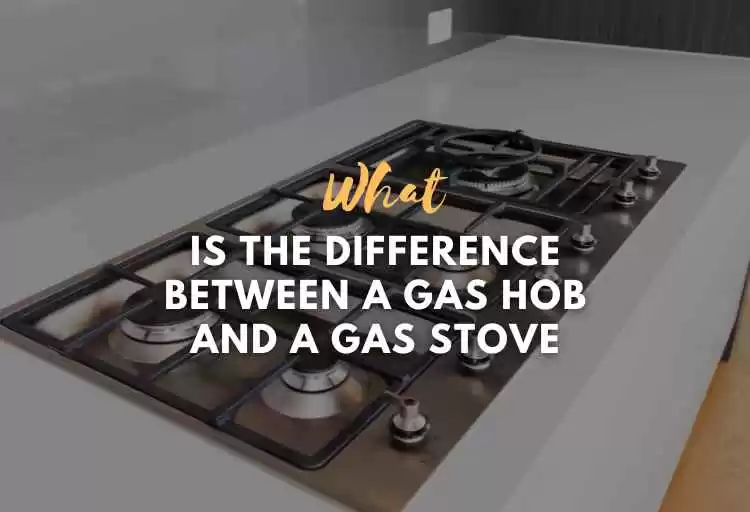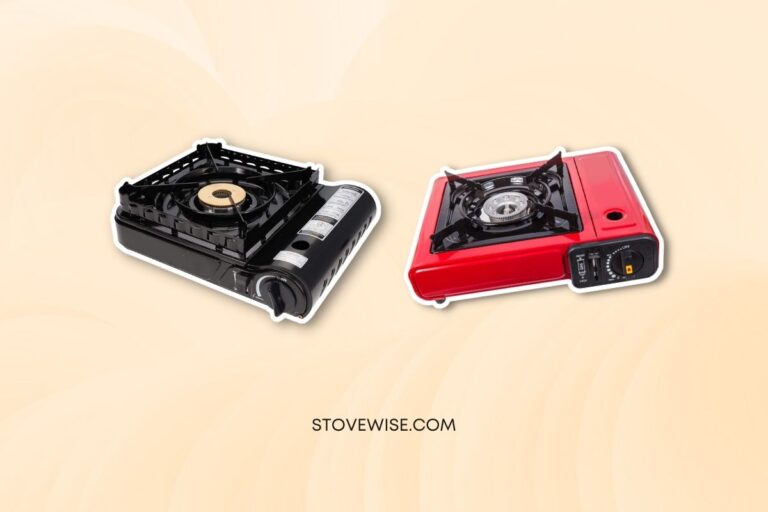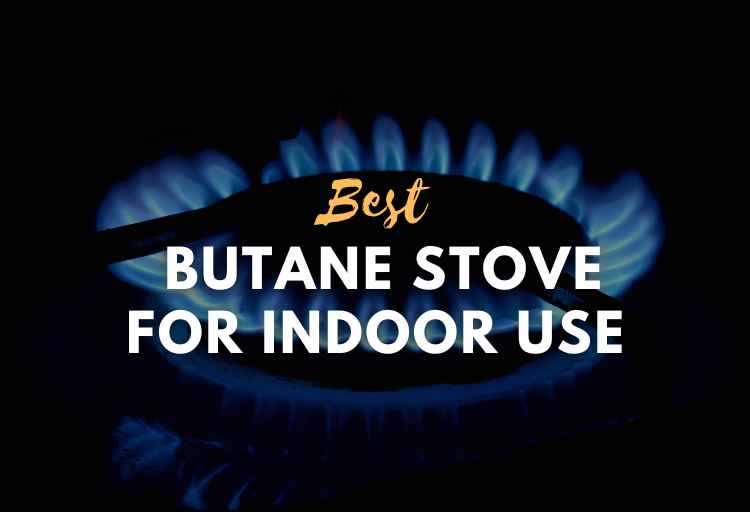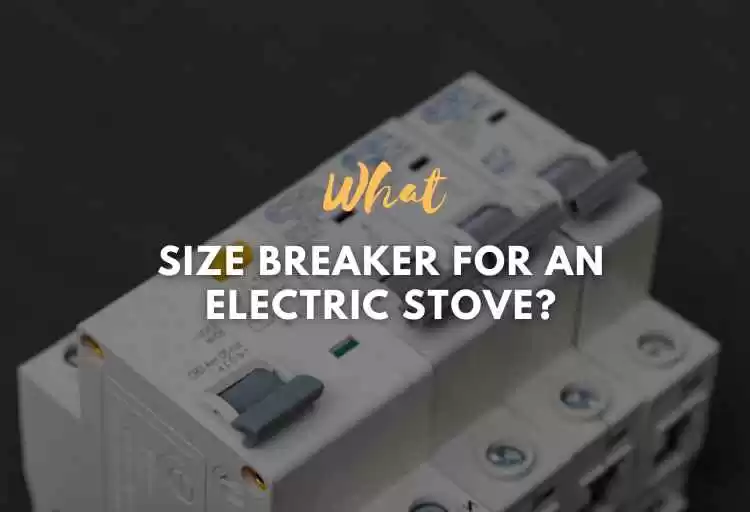What Is the Difference Between a Gas Hob and a Gas Stove?
Are you planning to upgrade your kitchen appliances and wondering which one to choose a gas hob or a gas stove? Well, you are not alone. Many homeowners face this dilemma when it comes to selecting the right type of cooking appliance for their kitchen.
In this article, I will discuss the difference between a gas hob and a gas stove, and help you make an informed decision.

Contents
What is a Gas Hob?
A gas hob is a cooking appliance that is designed to be mounted on a kitchen countertop. It consists of several burners that are fueled by gas. Gas hobs are available in different sizes, and they can be installed in various configurations, depending on the size and layout of your kitchen.
What is a Gas Stove?
A gas stove is a freestanding appliance that consists of an oven and a cooktop. The cooktop is fueled by gas and has several burners, just like a gas hob. The oven, on the other hand, is used for baking, roasting, and other cooking tasks that require an enclosed space with a consistent temperature.
Difference between a Gas Hob and a Gas Stove
Now that we have defined what a gas hob and a gas stove are, let’s discuss the differences between the two.
1. Size and Configuration
Gas hobs are available in different sizes and configurations. They can be installed in a variety of ways, depending on the size and layout of your kitchen. For example, you can install a gas hob on your countertop, or you can have it integrated into your kitchen island.
Gas stoves, on the other hand, are freestanding appliances that take up more space in your kitchen. They are available in different sizes, but they are not as versatile as gas hobs when it comes to installation options.
2. Cooking Flexibility
Gas hobs are designed for cooking tasks that require different heat levels. They usually have several burners with different heat outputs, which allows you to cook multiple dishes simultaneously at different temperatures.
Gas stoves offer more cooking flexibility because they come with an oven. This means that you can bake, roast, and grill in addition to cooking on the stovetop.
3. Energy Efficiency
Gas hobs are more energy-efficient than gas stoves. This is because they only heat the cookware and not the surrounding air. This means that gas hobs heat up faster and use less energy to cook food.
Gas stoves heat up the entire oven, which can result in energy waste if you are only cooking a small dish. However, if you frequently use your oven for baking or roasting, a gas stove may be more energy-efficient in the long run.
4. Maintenance
Both gas hobs and gas stoves require regular maintenance to ensure that they function properly. Gas hobs are easier to clean because they only have a cooktop and do not have an oven.
Gas stoves, on the other hand, require more maintenance because they have an oven that needs to be cleaned regularly. However, gas stoves usually come with a self-cleaning function that makes maintenance easier.
5. Cost
Gas hobs are generally less expensive than gas stoves. This is because gas hobs only have a cooktop and do not have an oven, which makes them less complex and less expensive to manufacture. Gas stoves are more expensive because they have an oven in addition to the cooktop.
Comparison Table for Hob vs Stove
here is a comparison table for hob vs stove:
| Feature | Gas Hob | Gas Stove |
|---|---|---|
| Size and Configuration | Available in different sizes and configurations. Can be installed in a variety of ways depending on the size and layout of your kitchen. | Freestanding appliance that takes up more space in your kitchen. Available in different sizes but not as versatile as gas hobs when it comes to installation options. |
| Cooking Flexibility | Designed for cooking tasks that require different heat levels. Usually, have several burners with different heat outputs, which allows you to cook multiple dishes simultaneously at different temperatures. | Offer more cooking flexibility because they come with an oven. This means that you can bake, roast, and grill in addition to cooking on the stovetop. |
| Energy Efficiency | More energy-efficient than gas stoves because they only heat the cookware and not the surrounding air. This means that gas hobs heat up faster and use less energy to cook food. | Heat up the entire oven, which can result in energy waste if you are only cooking a small dish. However, if you frequently use your oven for baking or roasting, a gas stove may be more energy-efficient in the long run. |
| Maintenance | Easier to clean because they only have a cooktop and do not have an oven. | Require more maintenance because they have an oven that needs to be cleaned regularly. However, gas stoves usually come with a self-cleaning function that makes maintenance easier. |
| Cost | Generally less expensive than gas stoves because they only have a cooktop and do not have an oven. | More expensive than gas hobs because they have an oven in addition to the cooktop. |
Both gas hobs and gas stoves have their advantages and disadvantages, and the choice ultimately depends on your cooking needs, preferences, and budget. Whichever option you choose, make sure to maintain it properly to ensure that it functions properly and lasts for a long time.
Which One Should You Choose?
Choosing between a gas hob and a gas stove ultimately depends on your cooking needs and preferences. If you cook frequently and require more cooking flexibility, a gas stove may be the better option for you.
However, if you have limited space in your kitchen or prefer to cook on the stovetop, a gas hob may be the better choice. Additionally, if you are on a tight budget, a gas hob may be the more affordable option.
Advantages of a Gas Hob
Here are the advantages and disadvantages of a gas hob:
- Low Energy Consumption: One of the main advantages of a gas hob is that it has low energy consumption. Although flame heating may seem ancient, modern gas hobs have extremely efficient flames for their burners, with minimum heat dispersion. Electric energy consumption is next to none, as it is required just for auxiliary technologies.
- Precise Temperature Control: Gas hobs offer precise temperature control, which is essential for cooking dishes that require different heat levels. You can easily adjust the flame to get the desired heat level, which allows you to cook multiple dishes simultaneously at different temperatures.
- Quick Heating: Gas hobs heat up quickly, which saves you time when cooking. The flames heat up the cookware directly, which means that you do not have to wait for the cooktop to heat up before you start cooking.
- Versatile: Gas hobs are versatile and can be used with a variety of cookware, including cast iron, stainless steel, and copper. This means that you can use the cookware that you already have in your kitchen without having to purchase new cookware.
- Easy to Clean: Gas hobs are easy to clean because they only have a cooktop and do not have an oven. You can simply wipe the cooktop with a damp cloth or sponge to remove any spills or stains.
Disadvantages of a Gas Hob
- Safety Concerns: Gas hobs can be a safety concern if they are not installed or used properly. Gas leaks can be dangerous and can cause fires or explosions. Additionally, gas hobs can produce carbon monoxide, which is a poisonous gas that can be harmful to your health if you are exposed to it for a long time.
- Installation: Gas hobs require professional installation, which can be expensive. You need to have a gas line installed in your kitchen, and the gas hob needs to be properly connected to the gas line. This means that you cannot install a gas hob yourself and will need to hire a professional to do it for you.
- Maintenance: Gas hobs require regular maintenance to ensure that they function properly. The burners can become clogged with food debris, which can affect their performance. Additionally, the gas hob needs to be cleaned regularly to prevent any buildup of grease or dirt.
- Uneven Heating: Gas hobs can produce uneven heating, which can be a disadvantage when cooking certain dishes. The flames may not distribute heat evenly across the cookware, which can result in uneven cooking. However, this can be addressed by using the right size of cookware and adjusting the flame to get the desired heat level.
- Limited Cooking Functions: Gas hobs only have a cooktop and do not have an oven, which means that they are limited in terms of cooking functions. You cannot bake, roast, or grill on a gas hob, which can be a disadvantage if you frequently cook dishes that require these cooking methods.
Conclusion
In conclusion, a gas hob and a gas stove are both excellent options for cooking in your kitchen. They both have their advantages and disadvantages, and the choice ultimately depends on your cooking needs, preferences, and budget.
Whichever option you choose, make sure to maintain it properly to ensure that it functions properly and lasts for a long time.



